|
|
|
Sort Order |
|
|
|
Items / Page
|
|
|
|
|
|
|
| Srl | Item |
| 1 |
|
| 2 |
ID:
014402
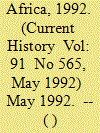

|
|
|
| 3 |
ID:
185514
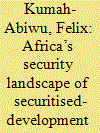

|
|
|
|
|
| Summary/Abstract |
Africa’s security landscape has been experiencing securitised-development practices through counterterrorism activities from donor countries engaged in the ‘Global War on Terror’ (GWOT). While some African governments continue to ‘benefit’ from the securitised-development agenda, critiques argue that there are human rights concerns that are connected to the practice of securitised-development. They have emphasised how some African governments and military actors involved in fighting the GWOT are also faced with human rights issues. To explore these issues, the article examines the securitised-development agenda in Kenya and Uganda and its impact on human rights. The article argues that the securitised-development practice is characterised by underlying contradictions involving the fight against terrorism and the accompanying human rights concerns in these countries.
|
|
|
|
|
|
|
|
|
|
|
|
|
|
|
|
| 4 |
ID:
155166
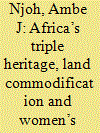

|
|
|
|
|
| Summary/Abstract |
Women have less access to land than men in Africa. Previous analyses have typically identified African indigenous culture as the problem’s exclusive source. With Cameroon, Kenya and Sierra Leone as empirical referents, an alternative explanation is advanced. Here, the problem is characterized as a product of Africa’s triple heritage, comprising three main cultures, viz., African indigenous tradition, European/Christianity and Arabia/Islam. The following is noted as a major impediment to women’s access to, and control of, land: the supplanting of previously collective land tenure systems based on family or clan membership by ‘ability-to-pay’ as the principal determinant of access to land.
|
|
|
|
|
|
|
|
|
|
|
|
|
|
|
|
| 5 |
ID:
082689


|
|
|
|
|
| Publication |
2008.
|
| Summary/Abstract |
By 1925, 30 years after Kenya became a British colony, there were no high schools for Africans in the colony. In 1926, the Africans decided to build their own high schools through their Local Native Councils (LNCs) but the Government refused to sanction the building of the schools and this led to a protracted struggle. The Kiambu LNC's abortive high school at Githunguri is used as a case study to examine not only why the Government vetoed the building of the schools, but also to show how this greatly undermined the expansion of African higher education in subsequent years.
|
|
|
|
|
|
|
|
|
|
|
|
|
|
|
|
| 6 |
ID:
115590
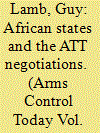

|
|
|
| 7 |
ID:
133289
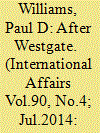

|
|
|
|
|
| Publication |
2014.
|
| Summary/Abstract |
The attack on the Westgate Mall in Nairobi, Kenya, in September 2013 intensified international scrutiny of the war against Harakat Al-Shabaab Mujahideen (Movement of the Warrior Youth). This article analyses the current state of affairs with reference to the three principal sets of actors in this war: Al-Shabaab, the African Union Mission in Somalia (AMISOM) and its international partners, and the various actors currently involved in building the Somali Federal Government's security forces. It argues that although the newly reconfigured Al-Shabaab poses a major tactical threat in Somalia and across the wider Horn of Africa, the movement is becoming a less important actor in Somalia's national politics. As Al-Shabaab loses territory and its popularity among Somalis continues to dwindle, other clan- and region-based actors will become more salient as national debates over federalism, the decentralization of governance mechanisms beyond Mogadishu and the place of clannism will occupy centre stage. As a consequence, AMISOM's principal roles should gradually shift from degrading Al-Shabaab towards a broader stabilization agenda: encouraging a national consensus over how to build effective governance structures; developing an effective set of Somali National Security Forces; and ensuring that the Federal Government delivers services and effective governance to its citizens, especially beyond Mogadishu in the settlements recently captured from Al-Shabaab. As it stands, however, AMISOM is not prepared to carry out these activities. More worryingly, nor is the Somali Federal Government.
|
|
|
|
|
|
|
|
|
|
|
|
|
|
|
|
| 8 |
ID:
060835
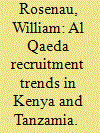

|
|
|
|
|
| Publication |
Jan-Feb 2005.
|
| Summary/Abstract |
At first glance, Kenya and Tanzania, the scene of some of Al Qaida's most impressive attacks, would appear to be fertile ground for recruiting militants into the global Islamist jihad. Substantial Muslim populations, widespread poverty, poor policing, inadequate border control, and systemic political and economic corruption would seem to make these East African countries potentially rich environments in which to attract new Al Qaida members. However, other factors essential to the terrorist recruitment process are largely absent. Despite claims that the traditionally tolerant Muslim populations of Kenya and Tanzania re being radicalized, the evidence suggests that Islamist radicals have in fact made little headway. Although individuals may have forged links with Al Qaida, Osama bin Laden and his network have few followers. Of course, this is subject to change. But in the near term, absent an environment of radicalism, as in a major recruitment ground like Pakistan, it is difficult to see how Al Qaida can expect to attract more than a handful of new members. That said, the United States could do far more in the region to prevent the emergence of violent Islamist extremism.
|
|
|
|
|
|
|
|
|
|
|
|
|
|
|
|
| 9 |
ID:
127766
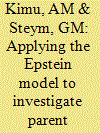

|
|
|
|
|
| Publication |
2013.
|
| Summary/Abstract |
Parent involvement in Kenya has mainly been limited to making financial contributions and serving on mandated school-parent bodies. Given the dire need to improve the quality of education, it is important to understand the role of parents in the provision of education. A qualitative research design explored the implementation of this model in primary schools in the Embu West District in Kenya. The findings revealed that limited parent involvement was a result of free primary education (FPE); the lack of a policy on parent involvement; the illiteracy of parents; parents' work commitments; lack of confidence in some parents; time constraints; the gendered nature of parent involvement; and the lack of parenting skills.
|
|
|
|
|
|
|
|
|
|
|
|
|
|
|
|
| 10 |
ID:
165929
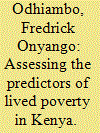

|
|
|
|
|
| Summary/Abstract |
Poverty remains pervasive in Kenya despite efforts to reduce it. This may be attributed to poor understanding of its predictors. Using Afrobarometer Round 7 data and employing multivariate logistic regression, the study found that age, religion and political affiliation were risk factors associated with poverty while education was a protective factor. The study recommends that investing more in all levels of education is key to reducing poverty in Kenya. Further, social protection policies and programmes for the elderly, as well as initiatives to enhance savings for those in the informal economy, are important for poverty reduction.
|
|
|
|
|
|
|
|
|
|
|
|
|
|
|
|
| 11 |
ID:
084594
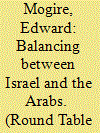

|
|
|
|
|
| Publication |
2008.
|
| Summary/Abstract |
This article attempts to illuminate Kenya-Middle East relations using a range of indicators such as trade, political-diplomatic interactions and Kenya's reaction to the Arab-Israel conflict. It examines the main factors underpinning this relationship and the form it is likely to take in the future. It shows that Kenya has strived to maintain relations with both the Arab-Islamic states and Israel. Although at the multilateral level Kenya's orientation tends to be pro-Arab, at the bilateral level it has maintained a close relationship with Israel. Kenya's foreign policy is non-alignment, support for African unity, and a radical orientation characterized by idealism as well as economic and security interests. Internal political imperatives, especially the Muslim influence, are the main factors underpinning Kenya-Middle East relations. While economic considerations will propel Kenya to strengthen its relations with Arab countries, security concerns, especially in the light of terrorist attacks, will ensure that relations with Israel will remain strong.
|
|
|
|
|
|
|
|
|
|
|
|
|
|
|
|
| 12 |
ID:
110890
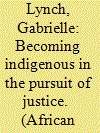

|
|
|
|
|
| Publication |
2012.
|
| Summary/Abstract |
The February 2010 ruling of the African Commission on Human and Peoples' Rights on the Kenyan government's violation of the Endorois people's rights is the Commission's most substantive and radical decision to date, with important implications for international jurisprudence, national politics, and local strategies - as well as potential socio-economic realities and inter-communal relations. The ruling combined a liberal interpretation of the African Charter with far-reaching recommendations and the request for a government progress report. It was the first time that the Commission had decided on and extended individual and peoples' rights to indigenous people, and is the first time in the world that a specific right to development has been adjudicated upon. By accepting the Endorois as an indigenous community the decision completes a process of ethnic invention that began in the 1990s, and has seen Endorois assert ethnic difference from their Kalenjin neighbours as a strategy of legal argument. The outcome is a victory for Endorois leaders and may help other communities tackle state injustice. However, the broad implications for social justice and inter-communal relations are contentious given the decision's reinforcement of an inherently exclusive sense of ethnic territoriality and neglect of gross inequalities in wealth and power. From this perspective, the decision reflects a modern obsession with the 'politics of recognition' to the neglect of a 'politics of redistribution'.
|
|
|
|
|
|
|
|
|
|
|
|
|
|
|
|
| 13 |
ID:
170211
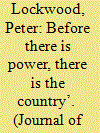

|
|
|
|
|
| Summary/Abstract |
This paper provides an ethnographic perspective on the street-level deliberations of Kenya's opposition supporters between the 2013 and 2017 elections, arguing that rather than appeals to ethnicity what defines its discourse are broader, inclusive notions of political membership. A civic nationalism is enunciated by opposition supporters that congeals support between multiple ethnic groups through its emphasis on universal values – democracy, due process, equality, adherence to the constitution. However, when such civic ideas are used in political campaigning and mobilising rhetoric, describing a resurgent Kenyan ‘people’ that has been systematically disenfranchised, they take on an exclusionary character. As ‘good constitutionalists’, opposition supporters contrast themselves with ‘bad nationalists’ associated with the government, portrayed as mobilising particularistic ethnic loyalties at the expense of a majority of Kenyans. In practice, their civic ideas remain only potentially inclusive.
|
|
|
|
|
|
|
|
|
|
|
|
|
|
|
|
| 14 |
ID:
167818
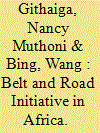

|
|
|
|
|
| Summary/Abstract |
China’s Belt and Road has been billed as the single most significant undertaking by the country on the international stage. In Africa, Kenya is a core part of both the Maritime Silk Road and the Belt. The authors have examined the flagship project of this initiative in Kenya, the Standard Gauge Railway (SGR) from the port of Mombasa to Nairobi, with a view to analyse the impact so far. Issues of employment, debt sustainability, neocolonialism and specific aspects of the project were looked at. Although our findings indicate that the SGR so far has both positive aspects as well as challenges, for the project to be successful both China and Kenya need to create a synergy towards solving concerns that have arisen from the completion of phase 1 of the project.
|
|
|
|
|
|
|
|
|
|
|
|
|
|
|
|
| 15 |
ID:
109928
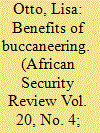

|
|
|
|
|
| Publication |
2011.
|
| Summary/Abstract |
The modern-day face of what is one of the world's oldest crimes - maritime piracy - is quite different to that of two centuries ago. Over the last decade the hub of global pirate activities has shifted from the East to Africa, with the growing scourge of Somali pirates - armed with automatic weapons and rocket-propelled grenades - having arisen as a global concern as a result of the consequences piracy holds for a litany of security, strategic and economic imperatives. The evolution of Somali piracy off the east coast of Africa has increasingly hinted toward the phenomenon constituting a lucrative industry in the region. Indeed, it is evident that there is a political economy attached to maritime piracy in Somalia and Kenya in particular, which elucidates that piracy is a crime that is based not only at sea, but also on land. By considering the financial system related to piracy, as well as the costs and impacts it holds for locals, there are a number of lessons for counter-piracy efforts, specifically those focusing on Somali piracy. Piracy can, nonetheless, be expected to continue to plague the continent's shores so long as pirates can act with impunity and operate in an environment where the risk is low and the reward high. Until sufficient political will is garnered for the constructive involvement of all stakeholders - the shipping industry included - in a holistic approach to the problem, both on land and at sea, the effects of counter-piracy efforts will be limited.
|
|
|
|
|
|
|
|
|
|
|
|
|
|
|
|
| 16 |
ID:
069116
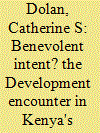

|
|
|
| 17 |
ID:
085984
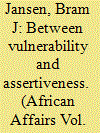

|
|
|
|
|
| Publication |
2008.
|
| Summary/Abstract |
Resettlement to third countries is regarded as a durable solution to refugee crises. In Kakuma refugee camp in north-west Kenya, seeking a better life in industrialized countries has become a preoccupation for many refugees. In this article the effects of the practice of third country resettlement on the camp population are explored. Increased ease of communication with the diaspora, expanded knowledge of entitlements, and the high visibility of resettlement processing within the camp have increased the demand for resettlement. The article argues that the result is an environment that encourages refugees to cheat through claiming insecurity and negotiating vulnerability. Refugees come to believe that resettlement is something that can be actively achieved, rather than a benefit extended only to the genuinely vulnerable
|
|
|
|
|
|
|
|
|
|
|
|
|
|
|
|
| 18 |
ID:
116434
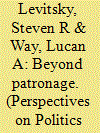

|
|
|
|
|
| Publication |
2012.
|
| Summary/Abstract |
We explore the sources of durability of party-based authoritarian regimes in the face of crisis. Recent scholarship on authoritarianism suggests that ruling parties enhance elite cohesion-and consequently, regime durability-by providing institutionalized access the spoils of power. We argue, by contrast, that while elite access to power and spoils may ensure elite cooperation during normal times, it often fails to do so during crises. Instead, the identities, norms, and organizational structures forged during periods of sustained, violent, and ideologically-driven conflict are a critical source of cohesion-and durability-in party-based authoritarian regimes. Origins in violent conflict raise the cost of defection and provide leaders with additional (non-material) resources that can be critical to maintaining unity and discipline, even when a crisis threatens the party's hold on power. Hence, where ruling parties combine mechanisms of patronage distribution with the strong identities, solidarity ties, and discipline generated by violent origins, regimes should be most durable.
We apply this argument to four party-based competitive authoritarian regimes in post-Cold War Africa: Kenya, Mozambique, Zambia, and Zimbabwe. In each of these cases, an established single- or dominant-party regime faced heightened international pressure, economic crisis, and a strong opposition challenge after 1990. Yet whereas ruling parties in Kenya and Zambia were organized almost exclusively around patronage, those in Mozambique and Zimbabwe were liberation parties that came to power via violent struggle. This difference is critical to explaining diverging post-Cold War regime outcomes: whereas ruling parties in Zambia and Kenya imploded and eventually lost power in these face of crises, those in Mozambique and Zimbabwe remained intact and regimes survived.
|
|
|
|
|
|
|
|
|
|
|
|
|
|
|
|
| 19 |
ID:
112126


|
|
|
|
|
| Publication |
2012.
|
| Summary/Abstract |
This article examines the demand for criminal accountability for the atrocities committed after Kenya's contested December 2007 elections. It explains why, despite strong popular desire for accountability through prosecutions and the threat of and actual International Criminal Court (ICC) involvement, the government has failed to take concrete steps to try those believed primarily responsible. The article argues that the fundamental reason why the government has not initiated systematic prosecutions in regular domestic courts - or created, as promised, a hybrid national/international tribunal - is that those in charge of establishing these processes are, in many cases, those whom it would prosecute or their close allies. A hybrid tribunal now seems unlikely and credible national trials are an improbable alternative, though there are some reasons to be more optimistic following the new constitution of 2010. For the time being only international justice, which is beyond the government's reach, can achieve a breakthrough in criminal accountability, albeit in a very limited way.
|
|
|
|
|
|
|
|
|
|
|
|
|
|
|
|
| 20 |
ID:
054339
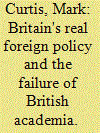

|
|
|
|
|
|
|
|